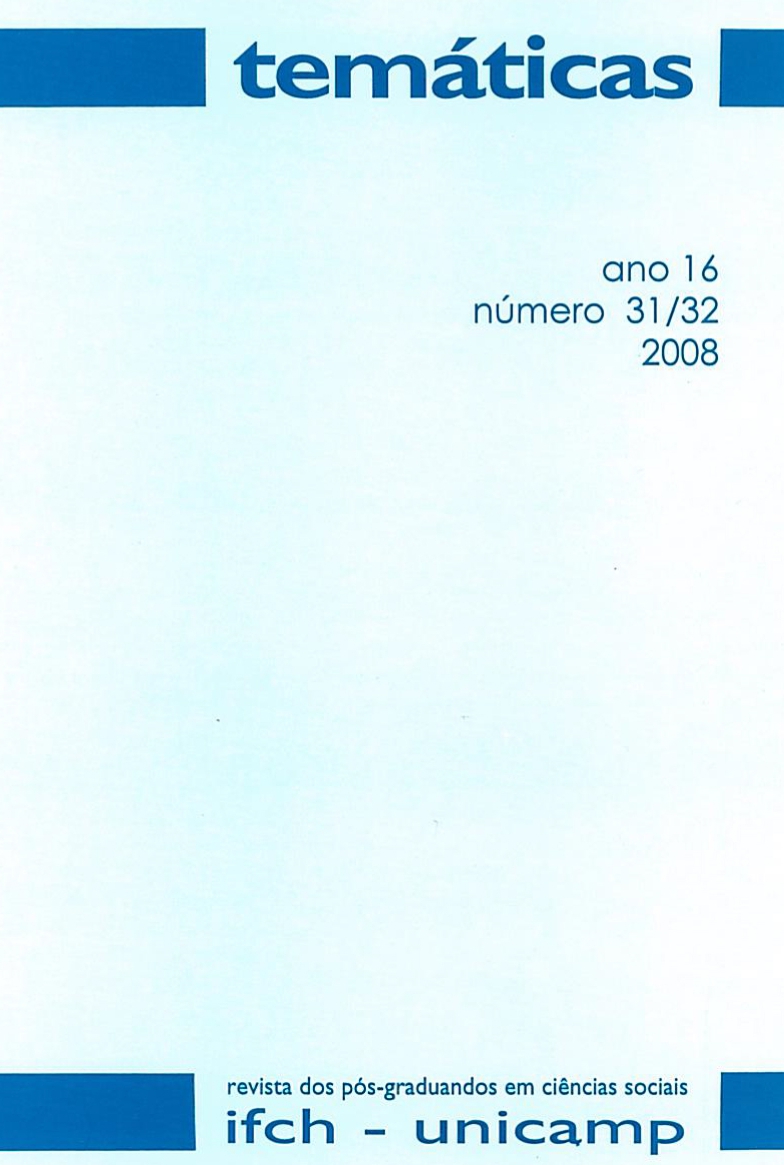Abstract
The article deals with the social construction of gender and the generational distinctions between the models and practices of production and reproduction of social life among a Tupi-Guarani-speaking population, inhabiting the borders bentween Brazil and Paraguay. The goal is to set up, from the attributes allocated to cach sex and generation, the way how people are integrated in the “domestic fire” of the kaiowa, an organizational model that correspond to the nuclear family, as wc know in the Brazilian society. The reflection proposed here intend to connect to the master thesis and the PhD dissertation where I did an approach of social morphology of kaiowa, susceptible not only to the form, according to the idea that this population traditionally conceive their institutions, but also to the deep transformations imposed by contact, as the grouping of population in the current reservations and the intensive process of environmental disruption.
References
BOURDIEU, Pierre. À dominação masculina. Rio de Janeiro: Bertrand Brasil, 2002.
BRAND, A. J. O confinamento e seu impacto sobre os Pai-Kaiowá. Porto Alegre. Dissertação (mestrado) Pontifícia Universidade Católica de Porto Alegre, 1993.
BRAND, A. J. O impacto da perda da terra sobre a tradição kaiowá/ Siaranis os difícies cossinhos da palavra. Porto Alegre. Tese (doutorado em História) — PUC/RS, 1997.
CADOGAN, León. Aporte a la Etnografia de los Guaraní del Amambái, Alto Ypané, Revista de Antropologia, V. X, n1 1-2, São Paulo, 1962, p. 43-91.
CHAMORRO, Graciela. Kurusu Ne'êngatn ou palavras que a história não poderia esquecer. Porto Alegre. Dissertação (Mestrado em História Ibero-Americana) — Universidade do Vale do Rio dos Sinos, 1993.
COHN, Clarice. Antropologia da Criança. Rio de Janeiro: Jorge Zahar Editor, 2005.
DESCOLA, PHILIPPE. La selva culta: simbolismo y praxis em la ecologia de los “Achar. México: Ediciones ABYA-YALA - (IFEA) Instituto Francés de Estudios Andinos, 1988.
DURKHEIM, Emile. As Formas Elementares da Vida Religiosa. o sistema totêmico na Austrália. São Paulo: Paulinas, [1912] 1988.
MELIÁ, B., GRÚNBERSG, G., GRÚNBERG, E. Etnografia Guaraní del Paraguay Contemporâneo: Los Pai-Tavyterã. Suplemento Antropológico. Assunción: Centro de Estudios Antropológicos de La Univerdad Católica, 1976.
MOTTA-MAUÉS, Maria Angelica. Na “casa da mãe” /na “casa do pai”: Anotações (de uma antropóloga e avó) em torno da “circulação” de crianças. Revista de Antropologia. 47 n.2 São Paulo jul./dez. 2004, 23p.
NIMUENDAJU, Curt U. As Lendas de Criação e Destruição do Mundo como Fundamentos da religião dos Apapociva-Guarani. São Paulo: HUCITEC; Editora da Universidade de São Paulo, 1987.
OVERING, Joanna. The Piaroa: A people of the Orinoco Basin. Oxford, Clarendom Press, 1975.
PEREIRA, Levi M. Mobilidade e processos de territorialização entre os Kaiowá atuais. In: Revista eletrônica de História em Reflexão: Vol. 1 n.1 — UEGD - Dourados Jun/Jul 2007. 26p. Disponível em: http://wwwufgd.edu.br
PEREIRA, Levi M.. Imagens Kaiowá do Sistema Social e seu Entorno. Tese de doutorado em Antropologia (etnologia). Universidade de São Paulo — USP, 2004.
PEREIRA, Levi M.. No mundo dos parentes: a socialização das crianças adotadas entre os Kaiowá. In: LOPES DA SILVA, Aracy; NUNES, Angela; MACEDO, Ana Vera Lopes da Silva (Orgs.) Crianças Indígenas: ensaios antrapológicos. São Paulo: Global, 2002, 168-187p.
PEREIRA, Levi M.. Parentesco e Organização Social Kaiowá. Campinas. Dissertação (Mestrado em Antropologia Social). Universidade Estadual de Campinas, Instituto de Filosofia e Ciências Humana, 1999, 244p.
SAHLINS, Marshall David. Cultura sa Prática. Rio de Janeiro: Editora UFRJ, 2004.
SCHADEN, E. Aspectos Fundamentais da Cultura Guarani. (10º ed. 1954) 30. ed. São Paulo: EPU/EDUSP, 1974.
SOUZA, Vânia Pereira da Silva. Tive fome e não me destes de comer: socialização e Processos educativos de crianças do Centro de Reabilitação Nutricional Infantil, Monografia especialização em Educação. Universidade Federal da Grande Dourados. Dourados, MS, 2008.
STRATHERN, Marilyn. The sender of the gift: problems with women and problems with society in Melanesia. Berkeley: Univ. of California Press, 1988.
TOMAZ DE ALMEIDA, R. E O Projeto Kaiowá-Nandeva: uma experiência de etnodesenvolvimento junto aos Kaiowá-Nandena contemporâneos de Mato Grosso do
Sul. Rio de Janeiro: Dissertação (Mestrado em Antropologia Social). Museu Nacional, Universidade Federal de Rio de Janeiro, 1991.
VIVEIROS DE CASTRO, Eduardo. 4 Inconstância da Alma Selvagem — e outros ensaios de antropologia. São Paulo; Cosac & N aify, 2002.
WATSON, J. B. Cayuá Culture Change; a study in acculturation and methodology. American A uthropological Association, v. 54, n1 2, part 2, 1952, p. 1-144.
WEISS. G. Campa Cosmology. The World of a Forest Tribe in South America. New York: American Museum of Natural History. 1975.

This work is licensed under a Creative Commons Attribution-NonCommercial-ShareAlike 4.0 International License.
Copyright (c) 2008 Levi Marques Pereira

